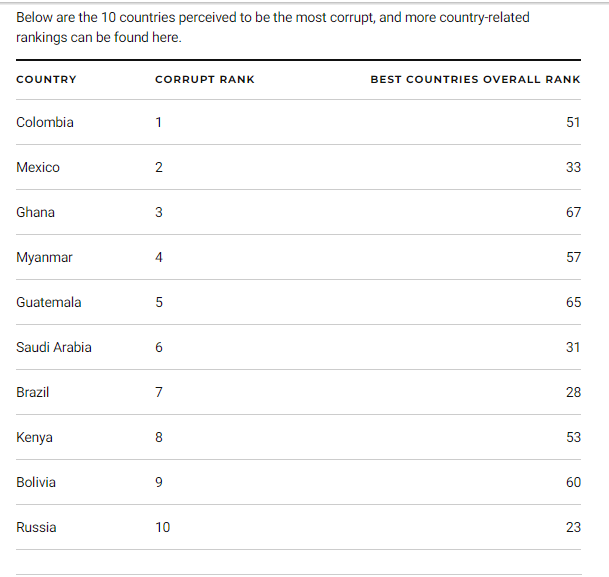The rankings are followed by Kenya perceived as the 8th most corrupt nation.
According to the survey, Colombia is perceived to be the most corrupt country in the world.
Mexico, known for its deadly drug cartels, follows Colombia as the No. 2 most corrupt country in the 2020 ranking. Ghana, Myanmar, Guatemala, Saudia Arabia, Brazil, Kenya, and Bolivia also made the top 10.
In the survey, respondents answered how closely they related each of the countries to the term "corrupt", the exact meaning of which was left to their own interpretation.
The attribute is factored into the Best Countries rankings for transparency, as well as the best countries to invest in and headquarter a corporation.
Transparency International, the non-governmental organization based in Germany, defines corruption as the misuse of public power for private benefit.
The organization's most recent version of its Corruption Perceptions Index also states that the failure to significantly control corruption is fueling a global crisis in democracy.
The attribute is factored into the Best Countries rankings for transparency, as well as the best countries to invest in and headquarter a corporation.
Colombia, which sees an estimated $14 billion a year in corruption-related costs, experienced a wave of anti-government protests starting at the end of November.
A new set of strikes could ensue after protest leaders meet with government officials later this month.
While the country is known for its decades of political scandals, voters recently elected Claudia López, a member of Colombia's green party and a prominent activist, as the mayor of Bogota. López is the first woman and openly gay individual to become mayor of Colombia's capital city.
Bolivia's interim government announced in January that it will investigate nearly 600 former officials who worked under Evo Morales, who resigned from his presidency in November.
Russia, which has been accused of election meddling and Olympic doping, joins the top 10 list this year after placing No. 12 in 2019.
Below are the 10 countries perceived to be the most corrupt.

)
)
)
)
)
)
)
)
)
)
)
)